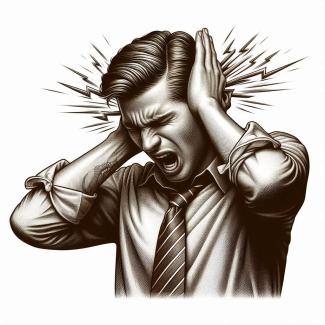
Tinnitus, commonly referred to as ringing in the ears, is a condition that affects millions of people worldwide. It's characterized by the perception of sound in the ears or head without any external source. These sounds can vary from ringing, buzzing, clicking, hissing, or whistling, and they may be intermittent or constant. For some individuals, tinnitus is a minor nuisance, but for others, it can be a persistent and distressing condition that severely impacts their quality of life.
While tinnitus is not a disease in itself, it is often a symptom of an underlying issue within the auditory system or related systems, such as the nervous or circulatory systems. There are various potential causes, ranging from exposure to loud noises, ear infections, and earwax buildup, to more serious conditions like circulatory problems or nerve damage. Although there is no definitive cure for tinnitus, there are treatments and coping mechanisms that can significantly alleviate symptoms and reduce the impact on daily life.
In this comprehensive guide, we will explore the nature of tinnitus, the various types of tinnitus, potential causes, diagnostic methods, and treatment options. We will also delve into the latest research and studies on tinnitus, providing a detailed overview of the current understanding of this condition.
What Is Tinnitus?
Tinnitus is the perception of noise or ringing in the ears when there is no external sound present. The word "tinnitus" comes from the Latin word tinnire, meaning "to ring." Tinnitus is not a single condition but a symptom of a range of underlying issues related to the auditory system, including the ears and the parts of the brain that process sound. The severity, type of sound, and frequency can vary widely among individuals.
Types of Tinnitus
There are two main types of tinnitus:
- Subjective Tinnitus: This is the most common type, where only the person experiencing the tinnitus can hear the sound. It is usually related to problems with the auditory pathways, such as damage to the hair cells in the cochlea or issues with the auditory nerve.
- Objective Tinnitus: This is a rare form of tinnitus where the sound can actually be heard by a doctor during an examination. This type of tinnitus is often caused by physical issues within the body, such as blood flow problems or muscle contractions in or around the ear.
In addition to these main types, tinnitus can also be classified by the nature of the sound:
- Tonal Tinnitus: A constant or near-constant ringing sound with a well-defined pitch.
- Pulsatile Tinnitus: A rhythmic sound that often corresponds with the person’s heartbeat, typically linked to circulatory issues.
- Musical Tinnitus: A rarer type of tinnitus where the person hears music or melodies. This can be associated with certain neurological conditions.
What Causes Tinnitus?
Tinnitus can be caused by a wide variety of factors, and in some cases, multiple factors may contribute to the development of the condition. Some of the most common causes include:
1. Noise-Induced Hearing Loss
Prolonged exposure to loud noises, such as from industrial machinery, concerts, firearms, or personal listening devices, is one of the leading causes of tinnitus. Loud noises can damage the hair cells in the cochlea, the part of the inner ear responsible for converting sound waves into electrical signals that the brain interprets as sound. Once these hair cells are damaged, they cannot regenerate, leading to permanent hearing loss and often tinnitus.
Research Study: According to a 2019 study published in The Journal of Clinical Medicine, nearly 80% of individuals who experienced noise-induced hearing loss also reported tinnitus symptoms. This research highlights the strong connection between prolonged noise exposure and tinnitus development, especially among young adults who frequently use headphones or attend loud music events.
2. Age-Related Hearing Loss
As people age, the natural wear and tear on the auditory system can lead to hearing loss, which is frequently accompanied by tinnitus. This condition, known as presbycusis, affects a significant portion of the population over the age of 60. Age-related hearing loss often involves damage to the inner ear and changes in auditory nerve function, both of which can contribute to the perception of tinnitus.
3. Ear Infections and Blockages
Ear infections, fluid buildup, or blockages caused by excessive earwax can result in tinnitus. In these cases, tinnitus usually resolves once the infection or blockage is treated. However, repeated infections or persistent blockages may cause long-term damage to the auditory system.
4. Ototoxic Medications
Certain medications are known to cause or exacerbate tinnitus, particularly at high doses. These medications are referred to as ototoxic drugs. Common ototoxic drugs include:
- Certain antibiotics (e.g., gentamicin)
- Nonsteroidal anti-inflammatory drugs (NSAIDs) like aspirin
- Diuretics (used to treat high blood pressure and fluid retention)
- Chemotherapy drugs, particularly cisplatin
Research Study: A study published in Frontiers in Neurology in 2020 explored the effects of ototoxic drugs on tinnitus development. The researchers found that a significant number of patients undergoing chemotherapy or long-term use of NSAIDs reported new or worsening tinnitus symptoms, highlighting the need for careful monitoring and alternative treatment options when feasible.
5. Head and Neck Injuries
Traumatic injuries to the head, neck, or ear can damage the auditory nerves, ear structures, or brain regions involved in hearing. Tinnitus resulting from these injuries can be more persistent and difficult to treat. Whiplash, concussions, and even temporomandibular joint (TMJ) disorders can all contribute to tinnitus symptoms.
6. Circulatory Problems
Tinnitus that pulses in time with the heartbeat (pulsatile tinnitus) may be caused by issues with blood flow. These could include:
- Hypertension (high blood pressure)
- Atherosclerosis (hardening of the arteries)
- Abnormal blood vessels (vascular malformations)
- Benign tumors, such as glomus tumors, that affect the blood vessels near the ear
How Does Tinnitus Affect Health?
Tinnitus can range from mildly annoying to completely debilitating, depending on the severity of the condition. Chronic tinnitus can have profound effects on a person’s overall health and quality of life, often leading to secondary issues such as:
1. Sleep Disturbances
Many people with tinnitus report difficulty falling asleep or staying asleep. The constant noise in their ears can make it challenging to relax, leading to insomnia and chronic sleep deprivation. Sleep disturbances, in turn, can exacerbate tinnitus symptoms and contribute to mental health issues such as anxiety and depression.
Research Study: A 2018 study published in The Journal of Sleep Research found that individuals with tinnitus are significantly more likely to experience insomnia and other sleep disturbances compared to the general population. The study also noted that cognitive-behavioral therapy (CBT) aimed at improving sleep hygiene was effective in reducing both insomnia and the perception of tinnitus.
2. Mental Health Issues
Living with chronic tinnitus can take a significant toll on mental health. The constant noise can lead to frustration, irritability, and difficulty concentrating. Over time, these symptoms can contribute to anxiety, depression, and even suicidal thoughts in severe cases.
Research Study: A study in The Lancet Psychiatry in 2019 found that individuals with chronic tinnitus were 2.5 times more likely to develop depression or anxiety than those without tinnitus. This study underscores the importance of addressing both the physical and psychological aspects of tinnitus in treatment plans.
3. Cognitive Impairment
Tinnitus, particularly when combined with hearing loss, can affect cognitive functioning. Many people with tinnitus report difficulty concentrating, memory problems, and a reduced ability to process complex information. This may be due to the brain's constant effort to "tune out" the tinnitus, which diverts cognitive resources away from other tasks.
Research Study: In 2020, a study in the Journal of the American Geriatrics Society found a strong correlation between tinnitus and cognitive decline in older adults. Participants with long-term tinnitus were more likely to experience memory problems and slower cognitive processing speeds, especially when hearing loss was also present.
How Can You Fix This Beeping?
While there is no one-size-fits-all cure for tinnitus, there are several approaches that can help manage and reduce the severity of symptoms. Treatment depends on the underlying cause of the tinnitus and the specific symptoms experienced by the individual.
1. Treat Underlying Conditions
The first step in treating tinnitus is identifying and addressing any underlying medical conditions. For example, treating high blood pressure or removing impacted earwax can sometimes resolve tinnitus. If an ear infection is the culprit, antibiotics or antifungal treatments may be prescribed.
2. Hearing Aids
For individuals with tinnitus linked to hearing loss, hearing aids can be highly effective. These devices amplify external sounds, making the tinnitus less noticeable. Many modern hearing aids also include built-in sound generators that produce soothing background noise to mask the tinnitus.
3. Sound Therapy
Sound therapy is a common treatment for tinnitus and involves using external sounds to mask or cover up the tinnitus. This can include white noise machines, nature sounds, or specialized tinnitus masking devices. By introducing more pleasant or neutral sounds, the brain can shift its focus away from the tinnitus.
Research Study: A 2017 study in The Hearing Journal evaluated the effectiveness of sound therapy in treating tinnitus and found that patients who used sound generators reported a significant reduction in their tinnitus symptoms after three months of consistent use.
4. Cognitive-Behavioral Therapy (CBT)
CBT is a form of psychotherapy that helps individuals change their thought patterns and behaviors related to their tinnitus. It has been shown to be particularly effective in reducing the emotional distress caused by tinnitus, even if it does not eliminate the noise itself.
Research Study: A 2019 meta-analysis in JAMA Otolaryngology reviewed the effects of CBT on tinnitus and found that it significantly reduced tinnitus-related distress, anxiety, and depression. The study concluded that CBT should be considered a first-line treatment for individuals struggling with tinnitus-related mental health issues.
5. Medications
While there is no specific medication that can cure tinnitus, certain drugs may help manage the associated symptoms, such as anxiety, depression, or sleep disturbances. Antidepressants, anti-anxiety medications, and sleep aids are sometimes prescribed to improve the overall quality of life for individuals with severe tinnitus.
6. Tinnitus Retraining Therapy (TRT)
TRT combines sound therapy with counseling to help individuals habituate to their tinnitus. Over time, the brain learns to "ignore" the tinnitus sound, reducing its impact on daily life. TRT typically takes 12 to 24 months to achieve full benefits, but many individuals report significant improvements.
Research Study: A 2020 study published in Audiology and Neurotology found that 80% of participants who underwent TRT reported a noticeable reduction in their tinnitus symptoms after one year of therapy.
7. Neuromodulation Devices
Neuromodulation is a newer approach to treating tinnitus that involves stimulating the auditory nerves or brain regions involved in sound processing. Devices such as the Lenire system use electrical or sound-based stimulation to retrain the brain's response to tinnitus.
Research Study: A 2020 clinical trial published in Science Translational Medicine tested a neuromodulation device on patients with chronic tinnitus and found that 86% of participants experienced a reduction in tinnitus symptoms after 12 weeks of treatment.
Tinnitus is a complex and often frustrating condition that can significantly impact a person's quality of life. While there is no universal cure, a variety of treatment options are available that can help manage the symptoms and improve overall well-being. By addressing underlying health conditions, utilizing sound therapy, and exploring cognitive-behavioral approaches, many individuals can find relief from the persistent beeping or ringing in their ears.
Ongoing research into tinnitus, including the development of neuromodulation devices and advancements in hearing aid technology, continues to offer hope for better management and, potentially, a cure for this condition. For those affected by tinnitus, early intervention and a comprehensive treatment plan are essential to minimizing the impact of this condition on daily life.






